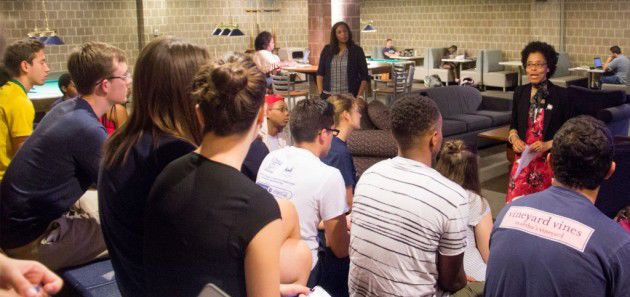Students discuss free speech
October 18, 2016
Last month, the Department of Student Life uninvited unsanctioned speaker Milo Yiannopoulos from coming to the University as part of his “Dangerous Faggots” tour. The cancellation sparked criticism from students and alumni –citing infringement of speech on the hands of the University. On Oct. 18, College of Republicans, College of Democrats, Office of Student Life and Office of Diversity and Inclusion co-sponsored “Community Conversation: Let’s Talk #FreeSpeech.”
JJ Brown, Director of Student Involvement, began the discussion by live-polling the 40 students, 17 of them white and 23 people of color, who gathered in the Cyber Lounge of the Connelly Center. After warming up the audience with “easy questions” (Do you think the Wildcats will repeat as national championships again? 61% said yes), Brown posed questions more pertinent to the students’ interests with regards to speech and the University. When asked, “Can you freely voice your opinion somewhere on this campus?” 91% said “yes.” 84% agreed there is a tendency to avoid political conflicts in particular on campus. When asked, “Is it ok to make jokes about people’s political views, race, gender, ability, etc.?” 40% said “yes.” Finally, 64% of students said they felt vulnerable or stigmatized because of who they are on campus. Before unpacking the results of the anonymous and live polls, the facilitators broke the students up in groups to begin conversations about feeling heard on campus.
In small groups students discussed topics they felt ‘unheard’ about on campus and ways campus could become more open to difficult conversations. Many different issues were raised, including tokenism, stereotypes and emotions related to feeling silenced and shamed for different views.
“The reason to have the event is to have a community conversation about freedom of speech, brave space and what it means to live in community of respect on campus,” Brown explained. “We would like student voices to be heard and even more important, come to listen to the thoughts, opinions, insights defining our campus community. Students are encouraged to come ready to suggest next steps about how to keep the conversation going! We hope to demonstrate how to have an open conversation at Villanova.”
With regards to the cancellation of Yianoppoulos, one student asked, “Had College Republicans gone through the proper channels of communication with Student Life, would Yianoppoulos been allowed to come to Villanova?” One facilitator from the Department of Student Life expressed doubt.
“If you look at how he does things, it’s on purpose,” the facilitator explained. “He doesn’t foster conversations in a respectful manner.”
After about an hour of small group discussions, the group reconvened in the Cyber Lounge to talk under the facilitation of Maurice Hall, Ph.D. Students expressed both encouragement and confusion. One female student of color felt unable to relate to other students of color’s experiences.
“I don’t feel marginalized by this [Villanova] community,” she said. “How does one feel marginalized here?”
A black student explained, “As a black man, I’ve felt unsafe on this campus. Black men have historically have been criminalized in America, and after hearing the decision to arm public safety, I didn’t feel safe.”
Common themes of feeling unheard, silenced, and ignored circulated among individuals. A number of students of color felt white, middle class men fit the “mold,” but a white student raised concern.
“I have my own social anxieties, but I feel like I’m never allowed to talk about them, because I have ‘white privilege,’” one student explained. “There’s this idea—you’re privileged and can’t complain. I’m losing my existence.” He continued, describing his Irish family members who freed enslaved people, saying, “[yet] we are lumped together and take on the burden of blame and white privilege.”
This comment opened discussion to a number of responses, reaching the conclusion that more open and honest conversations should occur on campus, particularly between groups that traditionally disagree with each other.
One student thanked him for his bravery and honesty, saying, “This is exactly what this forum is for.”
The night ended with Chief Diversity Officer, Terry Nance, Ph.D’s introduction of the Office of Diversity and Inclusion. Dr. Nance offered the office as a valuable resource to continue the dialogue and to bring about real structural change on the University’s campus.











